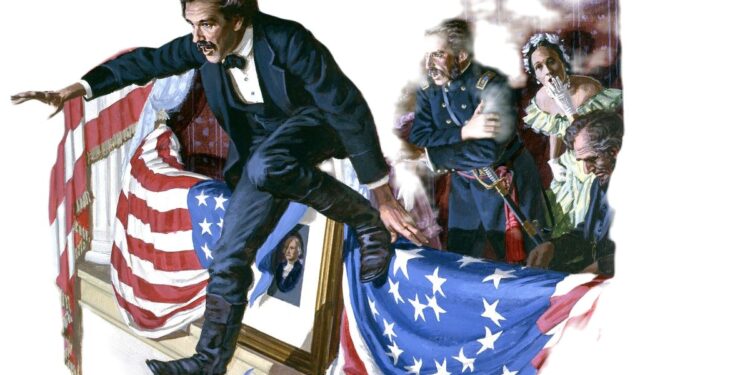Abraham Lincoln, the 16th President of the United States, and John Wilkes Booth, a Confederate sympathizer and actor, are forever intertwined in history through a tragic encounter that unfolded on the fateful night of April 14, 1865. This article delves into the lives of these two men, exploring their backgrounds, motivations, and the pivotal event that marked a turning point in American history.
Abraham Lincoln, born on February 12, 1809, in a log cabin in Hardin County (now LaRue County), Kentucky, emerged as a self-taught lawyer and politician. His rise to prominence culminated in his election as the President in 1860, at a time when the nation was on the brink of civil war over issues such as slavery and states’ rights. Lincoln’s leadership during the Civil War has been widely praised, and his Emancipation Proclamation in 1863 played a crucial role in transforming the conflict into a war against slavery.
Lincoln’s presidency was characterized by his commitment to preserving the Union and his efforts to reconcile a divided nation. His compassion and determination to end slavery earned him admiration, but it also stirred resentment among those who opposed his policies, including John Wilkes Booth.
John Wilkes Booth, born on May 10, 1838, into a prominent acting family, grew up in an environment steeped in the performing arts. However, Booth’s sympathy lay with the Southern cause, and he vehemently opposed the Union’s policies, particularly the abolition of slavery. His pro-Confederate sentiments intensified as the war unfolded, fueled by the Confederacy’s struggles on the battlefield.
Booth’s disdain for Lincoln grew, and he hatched a plan to strike a devastating blow against the Union by assassinating the President. On the evening of April 14, 1865, while attending a play at Ford’s Theatre in Washington, D.C., Lincoln fell victim to Booth’s sinister plot. Booth, armed with a small Derringer pistol, entered the President’s theater box and fired a fatal shot into the back of Lincoln’s head.
The aftermath of Booth’s heinous act unfolded rapidly. As chaos erupted in the theater, Booth managed to escape, leading authorities on a twelve-day manhunt that ended in his death. He was tracked down to a barn in Virginia, where he was shot and killed by Union soldiers. The tragic events surrounding Lincoln’s assassination left the nation in shock, mourning the loss of a leader who had guided them through one of the darkest periods in American history.
The assassination of Abraham Lincoln had far-reaching consequences for the nation’s reconstruction and the treatment of the defeated Southern states. Lincoln’s death marked the first assassination of a U.S. president and left an indelible mark on the nation’s psyche. The ensuing trial and execution of Booth did little to quell the grief and anger that gripped the country.
In conclusion, the lives of Abraham Lincoln and John Wilkes Booth intersected in a tragic and pivotal moment in American history. Lincoln’s commitment to preserving the Union and ending slavery clashed with Booth’s fervent Confederate sympathies, leading to the assassination that shook the nation to its core. The legacy of these two men remains etched in history, serving as a reminder of the enduring impact that individual actions can have on the course of a nation’s destiny.





Recent Comments